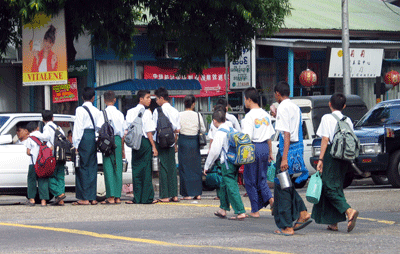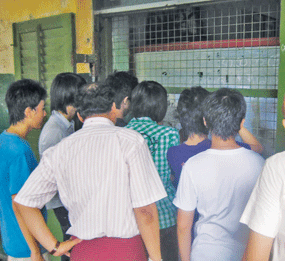It was cool and crisp in the early morning on Saturday June 11, 2011. The smells brought in by the monsoon winds were very pleasant. As I lay on my bed, I could hear the slow patter of a light drizzle outside. My younger was already stirring about and talking on his cell phone. This was unusual. He never liked to get up early but that day he evidently had.

When I got up from my bed, he was still talking with his friends. This made me curious so I moved closer. He was very animated and his face betrayed unmistakable emotion. Then he addressed our elder sister.
“Sister, please phone the school headmaster. Are you sure the results of the 10th Standard examinations will be released today?” he beseeched her. Such examinations are very important in determining who gets into university and gets to study what they want, and who doesn’t.
My sister asked him how many distinctions he expected to get. In order to get one, a student needs to score at least an 80 (out of a possible 100) in any particular subject.
My brother replied, “Sister, I hope I will get a distinction in three subjects—Economics, Physics and Chemistry—because I worked so hard for the whole year in class. Nonetheless, I am sure that I will get at least one.”
That was why he got up early and made such a racket in the house. He was excited because he felt examination distinctions were imminent.
His happiness was infectious. I experienced it myself when I finally graduated from 10th Standard. In Burma’s education system, the results of the 10th Standard examinations fix a students’ aptitude and skill levels as far as universities are concerned. In my opinion, that isn’t exactly fair.
Some schoolteachers claim that once a student passes the 10th Standard exams the rest is easy. Such students will make it through university without much trouble.
I have no argument with that. Those who pass with very high scores will find it easier and they can thus enjoy the excitement of the moment. But not everyone passes.
Some fall into depression if they don’t succeed. Others, though they’ve managed to score enough to squeak by in the exams, find it harder at university and difficult to major in the subject of their choice.
The daily life of many 10th Standard students begins or ends (sometimes both) with cram school. Parents will send their children to study at such institutions outside of school hours. For some, this offers an advantage in passing the examinations to come. Parents either don’t have the time, or don’t feel comfortable in confronting the education authorities about how to improve education in Burma. They are focused on how their children are doing and whether they can pass 10th Standard with those coveted distinctions.

Our town is neither big nor small. It does have, though, many renowned cram schools, as well as other schools with lesser reputations. All are just for 10th Standard students. The system is not egalitarian. Children from rich families go to the very best ones because they can afford to pay the high tuition fees. Some rich families will even commission private tutors drop by their homes and instruct their children. Children from middle and poor families cannot do any of this. If they can, they study at cheaper cram schools.
Cram schools for who live nearby have the advantage of convenience but for those from out of town attending can be a burden. And students must still attend public schools. Students will either have to get up much earlier or return home in the late evenings to travel the distances needed. But, since most really want to do well on the 10th Standard exams they persevere.
There are some crams schools offering room and board and these are popular with students whose families can afford the often-significant costs. The one I stayed at charged 3,000 kyats a month for tuition and accommodation. However, these days it costs 2,000,000 kyats a year.
Such cram schools often feature well-known and skilled educators. These schools compete in terms of results. Bragging rights extend to how many graduates received how many distinctions and in which subjects, how many were able to gain a place in a medical university and even, for example, how many were accepted by the Defense Services Academy. At such schools, students get to meet and mix with colleagues from other townships.
Whatever means students and their families employ, they must feel that passing the 10th Standard is like having climbed the highest mountain in the land. My brother told something of how hard it had been.
“I still remember the day that I fell asleep in cram school,” he told me. “It began like this. After I finished classes at public school, I went to my cram school dormitory room. I had only 15 minutes to rest and get ready for class. When the class began, I felt fresh. But that didn’t last and before long I had fallen asleep. That class was noisy but I still managed to doze off. Not only that, I had fallen into a very deep sleep. Two of my friends drew a moustache above my mouth with pens. When tutor called my name, I woke up immediately. He asked me some questions but my answers were totally mixed up. Everyone now knew I had been asleep. The students broke out in laughter when they saw the moustache on my face. That day was an unforgettable one.”
While students compete to score well, school life isn’t all work and no play. There are fashions to follow, music to listen to, personal relationships to start and motorbikes to ride.
“We had small breaks after each subject this gave us time to enjoy ourselves,” my brother recollected.
“Schoolgirls would gossip with each other like chattering birds. Boys often left the school grounds and visited other cram schools on motorbikes. We knew where those schools were as many of our friends were there. Even though we stayed at different cram school dormitories, we still studied together in the same public schools. We also had our motorbikes overhauled so their engines ran as loud as possible,” he said. “We were proud of riding such noisy motorbikes.”
Teachers don’t really like it when students do this. But to be honest this is something many of us do when we are young so a little understanding is best. There wasn’t all that much time for relaxing and the breaks in between classes weren’t that big. When I was a student, I’d wake up and 5:30 and not get back to bed until 10 pm at night. Except for meals and a big break between 3 pm and 4 pm, my time was mostly filled with cram school classes, public school ones, and studying for both.
All this effort leads to the one thing students are waiting for—the results of their 10th Standard examinations.
No doubt, hearts beat fast when that day finally comes. Parents feel the tension as well. They will offer prayers for their children’s success in the examinations. Students’ siblings also await the results with eager anticipation.
The results are released on the same day throughout the country. Some students will begin gather at their public school’s entrance gate in the early hours. By the time the school morning arrives, there are crowds. Everyone wants to see where his or her name is on the list.
The scene is the same nationwide but there are differing personal stories. Just as in a dramatic movie, there are a few voices of triumph—“I’ve done it. I passed with distinction in all the subjects’—followed by congratulations as though the student were a hero in battle.
Not everyone, though, makes it to the top of the mountain the first time. I took me two years to pass the exams because I didn’t study so hard in school. I wasn’t lazy but simply preferred to read literature. The second year I worked much harder and was able to pass.
When I was at the school to see my name on the list, I remember seeing one poor girl collapse as if in shock. The other students offered her aid and managed to revive her but she was profoundly unhappy. She hadn’t received a single distinction despite putting in great effort throughout the academic year. I tried to encourage her but to no avail.
Recalling that event made me wonder more seriously. Why does so much depend on the results of these examinations? Should they decide the path one takes in life? Is it fair that one’s real interests, possibilities and ambitions be cast aside because the numbers fall short?
Simply put, it isn’t fair at all. This is a major deficiency in the education system of Burma. In my opinion students should have more choices, especially in middle school. Why can’t students use those years to follow what interests them. For example, why are multimedia labs restricted? It is difficult for students to use computers and other equipment. I know of cases in which students were only allowed in the labs when government officials visited.
Another way education could be improved is with vocational training. Many companies want to see certificates showing that students have useful skills the companies want. Burma needs quality students with marketable skills.
Sadly, whether or not someone gets to follow an academic interest in university is not determined by personal choice but more by how well one did on a test on a particular day. I know this because when I entered university, I wanted to study computer science (the very same subject my brother now wants to study). But for me, that was not to be and I had to study geography.
My thoughts were flying around when my brother’s words broke my reverie.
“Brother, I passed the exam,” he declared. I got a distinction in just one subject. I had expected three but only got one,” my brother said to me. Although his total scores in all subjects were high, Economics was the only one he got a distinction in. He was not that happy.
I didn’t have the words to reply to him right away. We quietly left the school. I had this kind of experience. I didn’t know where my emotions were going to because my mind had been cluttered with thoughts and reminisces. Four years before, I had been where he was, waiting for results just like he had just done.
Finally, I looked at the school and walked away. Somehow, I felt it returned my gaze with a bit of a sympathetic smile.


